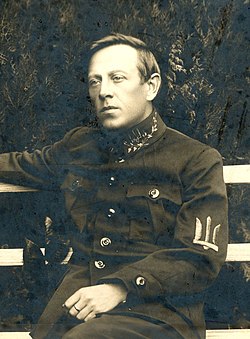
Back سيمون بتليورا Arabic سيمون بتليورا ARZ Semyon Petlyura Azerbaijani Symon Petliura BCL Сымон Васільевіч Пятлюра Byelorussian Сымон Пятлюра BE-X-OLD Симон Петлюра Bulgarian Symon Petliura Breton Símon Petliura Catalan Petlura, Simon Vasiliyayeviç CRH
Symon Petliura | |
|---|---|
Симон Петлюра | |
 Petliura in 1919 | |
| 2nd Chairman of the Directorate | |
| In office 11 February 1919 – 25 May 1926 (In exile from 18 March 1921) | |
| Prime Minister | |
| Preceded by | Volodymyr Vynnychenko |
| Succeeded by | Andriy Livytskyi1 |
| Secretary of Military Affairs | |
| In office 28 June 1917 – 6 January 1918 | |
| Prime Minister | Volodymyr Vynnychenko |
| Preceded by | Position established |
| Succeeded by | Mykola Porsh |
| Personal details | |
| Born | 22 May 1879 Poltava, Russian Empire |
| Died | 25 May 1926 (aged 47) Paris, France |
| Political party | RUP (1900–1905) USDLP (1905–1919) |
| Spouse | [1] |
| Children | Lesya (1911–1941) |
| Alma mater | Poltava Orthodox Seminary |
| Occupation | Politician and statesman |
| Signature |  |
| Military service | |
| Allegiance | Ukrainian People's Republic |
| Branch/service | Ukrainian People's Army |
| Years of service | 1914–1922 |
| Rank | Chief Otaman |
| Commands | Haidamaka Kish of Sloboda Ukraine |
| Battles/wars | |
| 1As President of Ukraine in exile | |
Symon Vasyliovych Petliura[a] (Ukrainian: Симон Васильович Петлюра; 22 May [O.S. 10 May] 1879 – 25 May 1926) was a Ukrainian politician and journalist. He was the Supreme Commander of the Ukrainian People's Army (UNA) and led the Ukrainian People's Republic during the Ukrainian War of Independence, a part of the wider Russian Civil War.
Petliura was born to a family of Cossack heritage in Poltava. From an early age he embraced socialism and Ukrainian nationalism, which he advocated through his highly prolific career as a journalist. After the 1917 February Revolution overthrew the Tsarist monarchy, the Ukrainian People's Republic was proclaimed and Petliura was elected head of its military. The Republic was briefly interrupted by the pro-German Ukrainian State, but in late 1918 Petliura, along with other members of the socialist Directorate of Ukraine, organised a revolt and overthrew the regime, restoring the Republic. He became the leader of the Directorate in early 1919, after the Bolsheviks invaded Ukraine and drove the UNA to Galicia. Facing imminent defeat, Petliura entered an alliance with Józef Piłsudski's Poland. The Polish–Soviet War concluded with Polish victory but Ukraine remained under Soviet control, forcing Petliura into exile. He initially directed the government-in-exile from Poland, but eventually settled in Paris.
During the Civil War, the UNA were responsible for the deaths of tens of thousands of Jewish civilians, and Petliura's role in the pogroms has been a topic of dispute. In 1926, Petliura was assassinated in Paris by Jewish anarchist Sholem Schwarzbard, who had lost relatives in the pogroms.

- ^ Biography of Petlura. dead link
- ^ Magocsi, Paul Robert. 2010. A History of Ukraine: The Land and Its Peoples. Toronto: University of Toronto Press, p. 538.
- ^ Zamoyski, Adam. 2007. Warsaw 1920: Lenin's Failed Conquest of Europe. London: HarperPress, p. viii.
- ^ Marples, David R. 2008. Heroes and Villains: Creating National History in Contemporary Ukraine. Budapest: Central European University Press, p. 57.
Cite error: There are <ref group=lower-alpha> tags or {{efn}} templates on this page, but the references will not show without a {{reflist|group=lower-alpha}} template or {{notelist}} template (see the help page).
© MMXXIII Rich X Search. We shall prevail. All rights reserved. Rich X Search